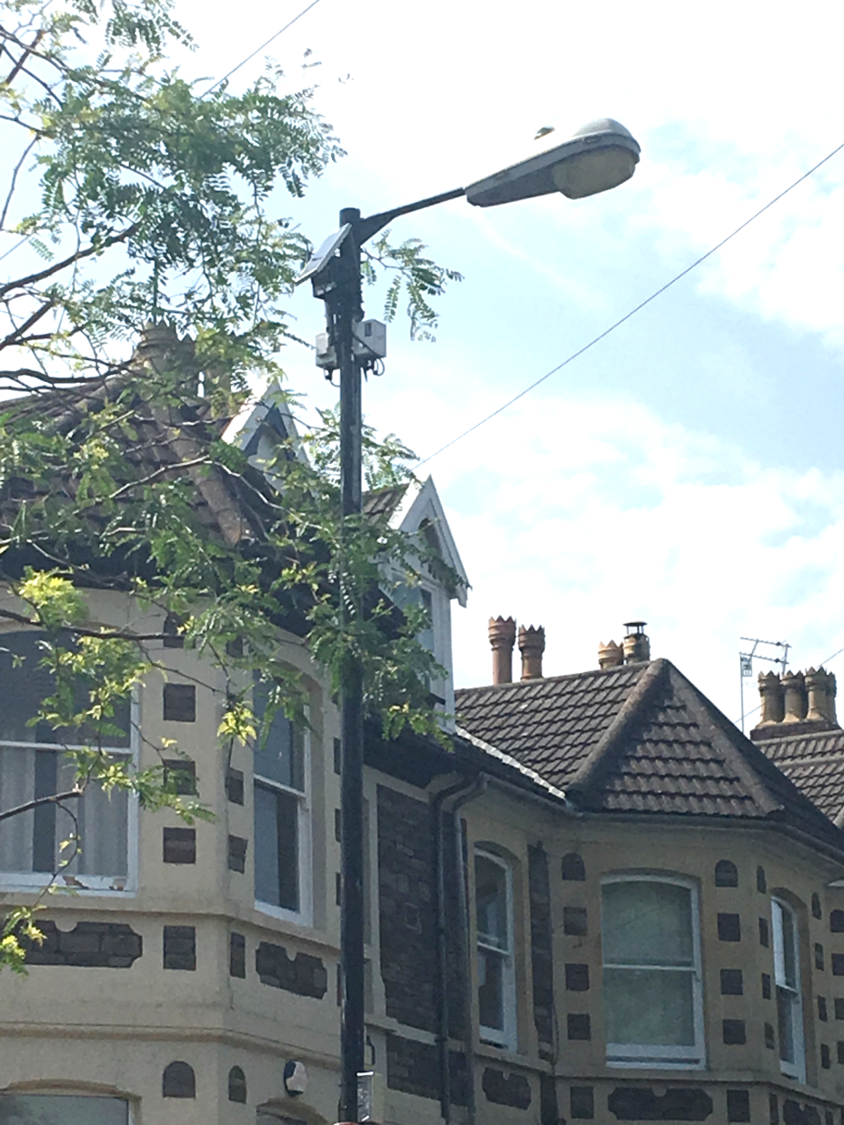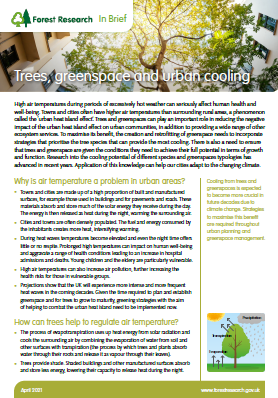This project aims to increase understanding of the contribution that trees make to urban environments.
Trees provide a wide range of benefits to urban society (for a useful summary see Delivery of Ecosystem Services by Urban Forests). The mechanisms by which many of these benefits are delivered are not fully understood, and the steps required to optimise delivery are poorly defined beyond increasing tree cover.
Cooling effect of street trees in Bristol
In cities the climate is significantly warmer than in the surrounding countryside. This is known as the Urban Heat island (UHI) effect. The UHI effect is caused by a range of factors including hard building surfaces which absorb and radiate heat and the design of urban areas which means they have less ventilation compared to rural areas.
The UHI effect can have negative impacts on human health, ranging from general discomfort to exhaustion, respiratory problems, and heat stroke. There is concern because as our climate changes it is expected that the UHI effect will increase in severity due to rising temperatures.
Greenspace and trees may be able to help us reduce the UHI effect as greenspace with trees has been shown to reduce temperatures in areas local to those greenspaces. However, the role of trees in urban areas in cooling air temperature needs to be better understood. Specifically, we need more data, collected at a higher accuracy and from a wider range of urban situations.

In this experiment we will be trialling Internet of Things (IoT) technology to gather data about street trees. Whilst IoT has the potential to deliver high quality data at a much lower cost, we specifically want to see how useful it will be at capturing data that will improve our knowledge of how trees in urban areas regulate the temperature of the surrounding area. We also want to understand both the opportunities and barriers to the more wide-scale use of this technology for this purpose.
Bespoke sensors, using the latest technology, will be installed and monitor the micro-climate of two urban streets. They will record information on air temperature, relative humidity, solar radiation, wind speed and wind direction. As well as testing the sensors, it is hoped the data gathered will provide insights into the contribution of urban street trees to air cooling. The sensors are planned to be installed towards the end of July 2019 and will be in place for 2-3 months.
Resilience of urban trees to a changing climate
Summary
This project aimed to investigate drought stress as a threat to urban trees in future climates.
Research Objectives
- Develop a drought tolerance index for the most prominent urban species
- Review how provenance/genetic variation can affect drought tolerance of selected species
- Highlight at risk areas/species under different drought and flood scenarios; and demonstrate the impact of these scenarios on the environmental and economic benefit provided by the urban forest
Findings and Recommendations
- Water stress contributes to the high tree mortality rates experienced in urban areas. This gives rise to direct costs due to replacement, and indirect ones linked to the loss of ecosystem services delivery.
- There is limited knowledge on how different species rate in their tolerance to successive drought events. This is needed especially for those commonly used in UK street plantings, to guide both species selection and watering regimes.
- This study found that, for young specimens of several broadleaf tree species, drought response varied as a result of prior exposure to drought.
- Populus tremuloides and Robinia pseudoacacia showed the greatest negative response during the first drought cycle, and had to be excluded from a second cycle.
- All other species investigated showed a greater response in the second cycle than in the first one (particularly Betula pendula, Quercus robur and Acer platanoides).
- The results found that tree species differ in their suitability to be used in water restrictive urban sites.
Publications
Vaz Monteiro, M., Doick, K.J., Lawrence, V., Albertini, A. Handley, P. (2017). Investigation into the drought tolerance of broadleaf street trees using chlorophyll fluorescence. ISHS Acta Horticulturae. 1189, 427-430.
Ashwood, R., Albertini, A., Doick, K.J. (2015) Best Practice Guidance Note for Land Regeneration No. 20: Drought Tolerant Tree Species and Land Regeneration. Forest Research, Farnham, 4pp.
Contact
Kieron Doick
The role of urban trees and greenspaces in urban climate regulation
Summary
This programme aims to study how urban trees and greenspaces can help regulate air temperatures in cities.
In 2011-2014, air temperatures around Kensington Gardens, were measured finding a cooling of up to 4°C when compared to control transects along two radial streets. This experiment was subsequently expanded to investigate the role of greenspace size on the amount of cooling provided and eight additional greenspaces with differing characteristics across London were investigated.
Forest Research has also published two papers giving a series of scenarios that illustrate how a tree can cool the environment, and an investigation focusing on the evaporative cooling provided by three urban forests and modelling the air-conditioning energy savings associated with that cooling.
A Forestry Commission Research Note on the cooling benefits of urban trees and greenspaces was subsequently published in 2019. The Research Note summarises the groups work in this field, reviews the latest science and highlights knowledge gaps. This programme is continuing this research and is currently considering the effects of street trees on local air temperatures and thermal comfort of residents.
Status
This research started in April 2011 and is currently ongoing.
Research Objectives
- Investigate the local cooling effects of urban trees and greenspaces
- Examine how greenspace size and characteristics influence the amount and pattern of cooling
Latest Updates

Our latest publication on urban climate regulation is Trees, greenspace and urban cooling.
This Forest Research In Brief report summarises work reported by Vaz Monteiro et al. (2019).
Urban cooling from trees and greenspaces is expected to become more important in future decades in our changing climate.
Tree species, site, and size and position of greenspaces all impact the cooling that trees and greenspaces can provide. These factors must be taken into account in urban planning to maximise the benefits provided.
Publications
Vaz Monteiro, M. and Doick, K. J. (2021). Trees, greenspace and urban cooling. Forest Research In Brief 002.
Vaz Monteiro, M., Handley, P., Morison J.I.L., Doick, K.J. (2019). The role of urban trees and greenspaces in reducing urban air temperatures. Forestry Commission Research Note. Forestry Commission, Edinburgh.
Moss, J.L., Doick, K.J., Smith, S.T., Shahrestani, M. (2019). Influence of evaporative cooling by urban forests on cooling demand in cities. Urban Forestry & Urban Greening. 37, 65-73. https://doi.org/10.1016/j.ufug.2018.07.023.
Smithers, R.J., Doick, K.J., Burton, A., Sibille, R., Steinbach, D., Harris, R., Groves, L., Blicharska, M. (2018). Comparing the relative abilities of tree species to cool the urban environment. Urban Ecosystems. 21, 851-862. https://doi.org/10.1007/s11252-018-0761-y.
Vaz Monteiro, M., Doick, K.J., Handley, P., Peace, A. (2016).The impact of greenspace size on the extent of local nocturnal air temperature cooling in London. Urban Forestry & Urban Greening. 16, 160-169. http://dx.doi.org/10.1016/j.ufug.2016.02.008.
Doick, K. J., Peace, A. and Hutchings, T. R. (2014). The role of one large greenspace in mitigating London’s nocturnal urban heat island. Science of the Total Environment, 493, p.662–671. http://dx.doi.org/10.1016/j.scitotenv.2014.06.048.
Doick, K.J., Hutchings, T.R. (2013). Air temperature regulation by urban trees and green infrastructure. Forestry Commission Research Note. Forestry Commission, Edinburgh.
Contact
Kieron Doick
Forestry Commission policy
Climate change represents a significant threat to urban infrastructure, environmental quality and the health of city dwellers. Green infrastructure is itself at risk through greater extremes in temperature fluctuation, consequent flourishing of tree pests and diseases, drought and perceived increased risk of subsidence leading to tree removal.
There is no clear system for determining the biophysical interactions, benefits, or managing potential trade-offs within a risk-benefit context, so as to optimally support the protection and sustainable regeneration of UK towns and cities. The Urban Trees and Greenspace in a Changing Climate Programme intends to develop such a system through consolidating and building upon existing work to provide the evidence base for urban trees, definition and communication of best practice guidance, and robust assessment, evaluation and dissemination tools so that the risks and benefits of urban tree placement can be more fully assessed by society, policy makers and planners.
The Programme also maintains the centre of excellence which FR has developed over several decades on land regeneration practices to establish and maintain urban greenspaces on former brownfield and contaminated sites.

